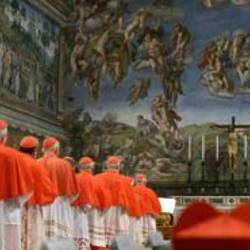An Overwhelming Consensus Born Away from the Spotlight
By Andrea Tornielli
Jorge Mario Bergoglio has never much loved curial meetings and in recent years he has come to Rome as little as possible. In the two weeks preceding the start of the Conclave he did not participate in any meeting that was related to his potential nomination to the papacy. How is it possible that in just five ballots he reached, and apparently easily surpassed, the quorum of 77 votes necessary for the election? The outcome of the previous conclave, during which, according to the diary published by Italian magazine Limes, Bergoglio obtained about 40 votes, was not decisive. Indeed, being in the running but with unsuccessful results in the 2005 election from which Benedict XVI was elected could have represented a handicap rather than an aid. We should not forget that after that Conclave the authority of the Archbishop of Buenos Aires increased even more. For example, during the CELAM meeting in Aparecida and in the Synods of bishops. The brief and heartfelt speech that Bergoglio gave in the course of General congregations struck a particular chord with cardinals, as he spoke about the face of God's mercy. While the real and media nominations of Cardinal Angelo Scola, Archbishop of Milan, of Canadian Cardinal Marc Ouellet, and of the Archbishop of Sao Paulo, Odilo Scherer were growing, Bergoglio's was also growing away from the spotlight. Several cardinals from various continents, such as Africa and Asia, had decided to vote for him from the very beginning. Surprisingly, even some Italian curials chose him immediately as a candidate. The primaries of the Conclave, on Tuesday evening, March 12th, showed the solidity of his candidacy, which was significant from the onset in terms of votes. While Scola's appeared less solid than expected. "Regardless of what has been said, Cardinal Scola did not achieve the consensus," said the President of the Brazilian Bishops' Conference, Raymundo Damasceno, interviewed by Globo.com. Ouellet and Scherer's nominations also appeared downsized. The vote at the end of the first day of the Conclave indicated that Bergoglio activated the "Ratzinger effect", namely that the Argentine cardinal earned votes progressively until the white smoke on Wednesday evening. He eventually gained Ouellet, Scherer and finally Scola's votes. "South American cardinals," added Cardinal Damasceno, "have greatly appreciated the value of Bergoglio, so it is clear that he managed to garner such strong support." There is a lot of anticipation to see what the first moves of the new Pontiff will be. What appointments will he make? Who will he designate as Secretary of State? The fact that he is not Italian would lead one to contemplate the possibility of an Italian "number two", maybe from the diplomatic service. Certainly there are not many people of the Curia who are linked by a long friendship with Pope Francis. One of these is Ouellet himself, as well as Cardinal Jean Louis Tauran (the proto-deacon who on Wednesday made the announcement of the Habemus Papam) and the Secretary of the Pontifical Commission for Latin America, Guzman Carriquiry, the lay person with the highest position within the Holy See. After the criticisms against his management of the Roman Curia, but primarily for reasons of age, many expect a quick replacement of the Secretary of State, Tarcisio Bertone, and it is likely other such substitutions will follow. "Many times in the past," said Fr. Federico Lombardi yesterday, "there has been turnover in the early days, but with the form donec aliter provideatur, that is until something else is provided for". A formula with which the Pope, while confirming everybody in all current positions, would have free rein to change his "ministers" in the short to medium term.
|
.
Any original material on these pages is copyright © BishopAccountability.org 2004. Reproduce freely with attribution.
